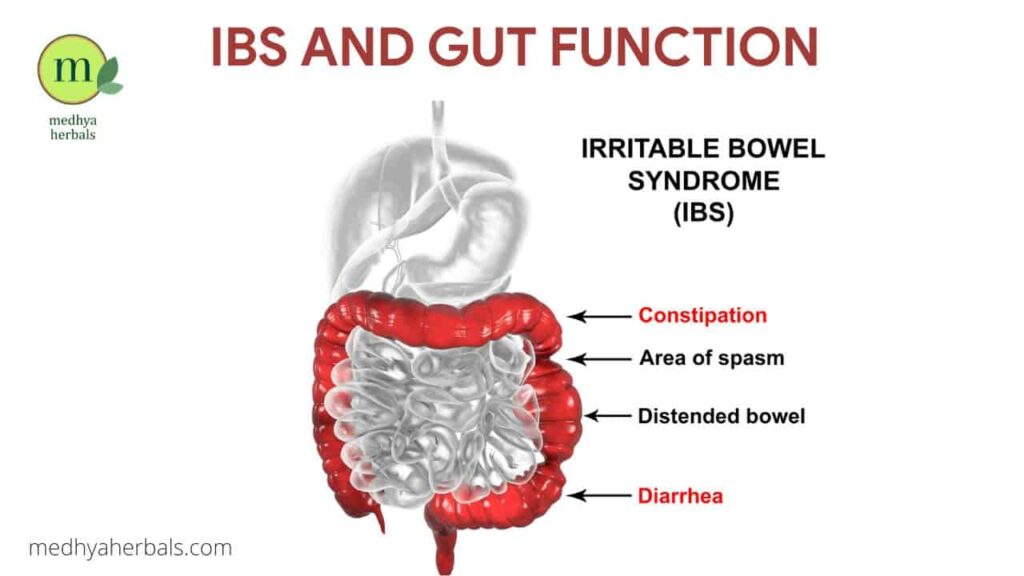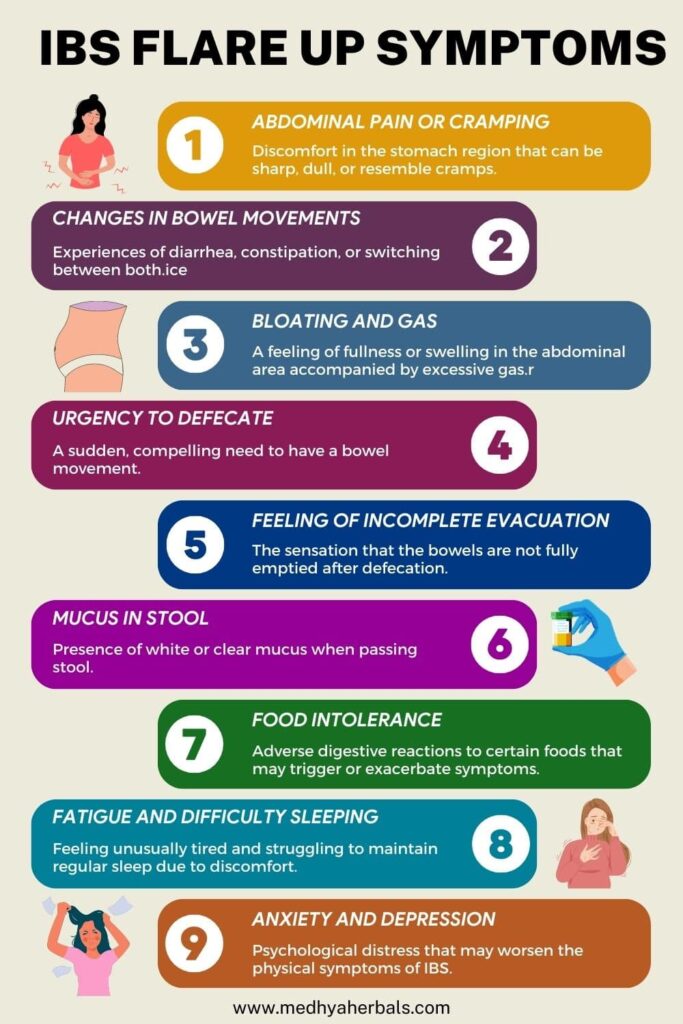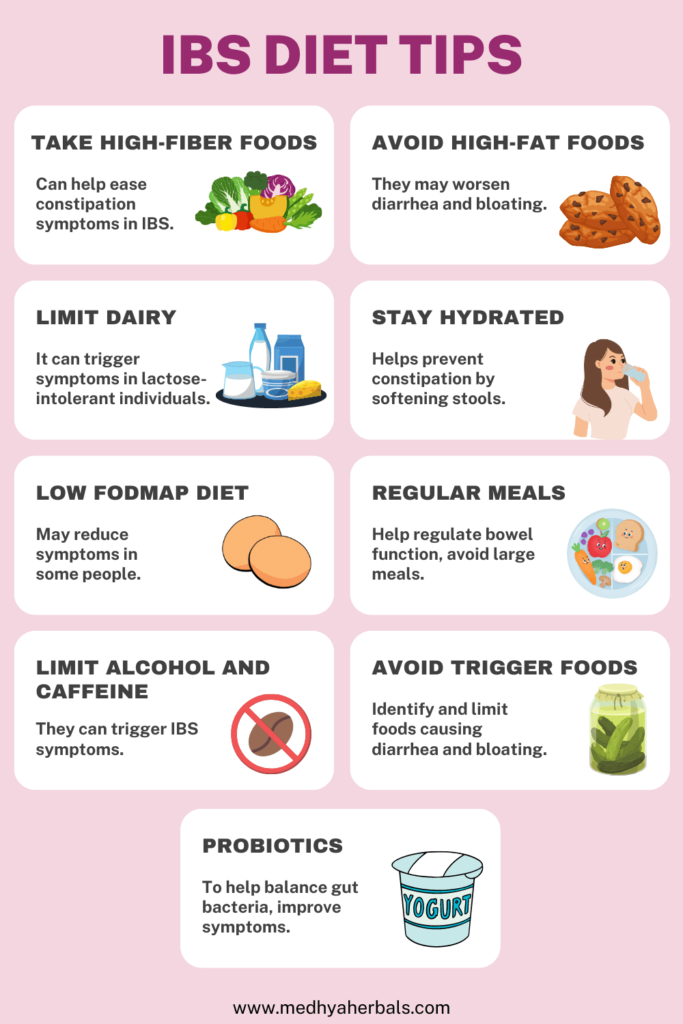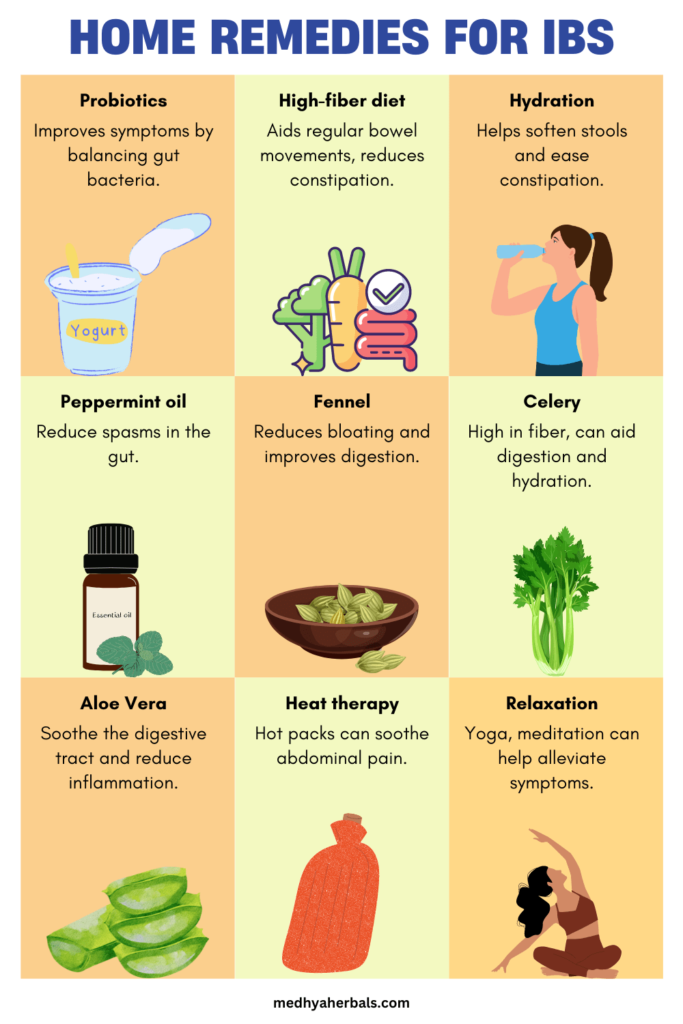Irritable Bowel Syndrome (IBS) is a common gastrointestinal disorder affecting millions of people worldwide. It is characterized by a group of symptoms that include abdominal pain, bloating, and changes in bowel movements, such as constipation and diarrhea.
IBS can cause a great deal of discomfort and disruption to your daily life, thus leading to anxiety and stress. While modern medicine offers several treatments for IBS, they often come with side effects and provide only temporary relief.
Ayurvedic treatment for IBS offers a holistic approach to managing irritable bowel condition by focusing on diet, lifestyle, and herbal remedies. By healing your gut and thus addressing the root cause of the IBS, Ayurvedic treatment can provide permanent relief from IBS.
In this article, we will explore the best Ayurvedic medicines, foods to avoid, and natural remedies to alleviate IBS symptoms and help you lead a healthy and happy life.
Understanding Irritable Bowel Syndrome
IBS is a functional disorder related to an irregular bowel movement. Irritable Bowel Syndrome Symptoms are present in nearly 9% – 21% of the general population. People with IBS have different types of symptoms that can include constipation, diarrhea, or alternating episodes of constipation and diarrhea.
Hence, IBS is classified according to the primary symptoms that a patient faces: IBS with constipation (IBS-C), with diarrhea (IBS-D), Mixed IBS (IBS-M) with both constipation and diarrhea.

IBS Symptoms
The symptoms of IBS vary with the intensity of the disorder and with the specific imbalances in the body of the patient. Here are the most common IBS Symptoms:
- Abdominal pain – A feeling of cramping and pain in the lower half of the belly. It is usually eased or partly eased after passing a bowel movement.
- Formation of excess gas or bloating in the stomach
- Diarrhea mostly with violent ones
- Constipation is sometimes alternating with painful episodes of diarrhea
- An occurrence of mucus in the stool. Stools may be harder or smoother, or ribbon-shaped
- Some people also suffer from urinary symptoms or sexual problems.
It is important to see your doctor if you have a persistent change in bowel habits or if you have any other signs of IBS.

What Causes Irritable Bowel Syndrome?
There are many things that worsen the symptoms of IBS like certain foods, medicines, poor eating habits, and mental stress. Therefore an IBS patient needs to know about the triggers and accordingly make changes in diet and lifestyle to avoid them cautiously.
1. Foods that trigger IBS
Many people suffer from IBS or their IBS symptoms get worsened by eating or drinking specific foods or beverages. For example, dairy products, wheat products, citrus fruits, beans, cabbage, and carbonated drinks worsen the symptoms of IBS.
Many people go through severe symptoms right after the meals or after the consumption of meals rich in complex carbohydrates, caffeine, spices, lactose, fatty foods, or alcoholic drinks.
2. Hormonal Changes
In comparison to men, women are more susceptible to have IBS. In fact, women are twice as likely to have IBS symptoms during hormonal changes such as during Pregnancy, at Menarche, or in Perimenopause. Many women experience the signs and symptoms of IBS getting worse during or around their menstrual cycle.
3. Stress
Most of the time, people having IBS experience the signs and symptoms more when they are highly stressed. A lot of times psychosocial factors such as physical or mental abuse, bad experiences such as accidents, or loss of loved ones can lead one to stressful conditions and hence trigger IBS symptoms.
Most people with IBS find that the symptoms are worse or more frequent during periods of increased stress, such as final week or the first few weeks on a new job.
4. Antibiotics
Antibiotics can worsen or trigger IBS as they impact our gut flora. Regular use or abuse of antibiotics can also be the cause of permanent alteration of gut microbiome and hence a condition as IBS.
5. Microbial or Viral Infections of the digestive system
Severe infection can be another cause of IBS. After a severe bout of diarrhea (gastroenteritis) due to bacteria or a virus, this problem can occur. IBS occurs due to bacterial overgrowth or a surplus of bacteria in the intestines.
6. Changes in bacteria in the Gut
Microflora, the “good” bacteria are found in the intestines and these play a key role in keeping us healthy. Research reveals that there are some differences between the microflora in people with IBS and healthy people.
7. Irregular Intestinal Contractions
There are layers of muscle present on the walls of the intestines which contract with the moving of food through the digestive tract.
When the contractions are stronger and continue for a longer time than normal can create gas, bloating and diarrhea.
On the other hand, weak intestinal contractions can reduce the flow of food passage and cause constipation and hard, dry stools.
8. Inflammation in the intestines
There is a much higher number of immune system cells present in the intestine of some people with IBS. These cells are responsible for causing pain and diarrhea.

Ayurvedic Perspective of Irritable Bowel Syndrome
IBS is not really a disease. It is actually a cluster of symptoms related to poor digestive system health. In Ayurveda, IBS is called “Grahani”. It is classified as a major health disorder of digestive system.
According to Ayurveda, accumulation of toxins in the digestive tract along with imbalance in the three Dosha, Vata, Pitta and Kapha – can lead to development of IBS. Toxin build up leads to inflammation of the digestive tract and disturbs the normal functioning of the digestive system.
Vata Type IBS
Vata-type IBS is characterized by irregular bowel movements, constipation, bloating, and abdominal pain. It is caused by an aggravation of the Vata dosha, which is responsible for all motions inside the body including excretion.
Pitta Type IBS
Pitta-type IBS manifests as diarrhea, inflammation, and a burning sensation in the stomach. It occurs due to an imbalance of the Pitta dosha, which governs digestion and metabolism.
Kapha Type IBS
Kapha-type IBS is marked by sluggish digestion, mucus in the stool, and a feeling of heaviness in the abdomen. This type of IBS results from an excess of the Kapha dosha, which is responsible for maintaining body structure and fluid balance.
Ayurvedic Treatment for IBS
Ayurvedic treatment for IBS focuses on restoring balance to the doshas, strengthening the digestive system, and alleviating symptoms. This is achieved through a combination of dietary modifications, herbal remedies, and lifestyle changes.
Research has shown that Ayurvedic treatment can be effective in managing IBS symptoms. In one study, patients who received Ayurvedic treatment experienced a significant reduction in IBS symptoms compared to those who received standard care.
Ayurvedic treatment for IBS involves following steps:
- Systematic detoxification of the digestive tract to clear out “Ama”.
- Establish digestive fire or Agni, so that the patient starts to experience regular appetite and bowel movement.
- Practice yoga and pranayama to balance vata and pitta dosha, promote mental wellness, and relieve stress.
- Diet, herbs, and lifestyle to promote balance of dosha and conserve the digestive fire. This will prevent onset of IBS in the future.

Ayurvedic Medicines for IBS Treatment
Regular use of Ayurvedic Herbs (as per prescription from an Ayurvedic Doctor) can help to establish the digestive fire, clear out the toxins, and relieve the symptoms of IBS. Here are some of the best Ayurvedic herbs and medicines for IBS:
- Triphala: Triphala is a combination of three fruits that can help promote healthy digestion and alleviate constipation and diarrhea. It also has anti-inflammatory properties that can reduce gut inflammation.
- Kutajarishta: Kutajarishta is an Ayurvedic medicine made from the bark of the Kutaja tree. It can help reduce inflammation in the gut and alleviate symptoms like abdominal pain and bloating.
- Avipattikar Churna: Avipattikar Churna is an herbal powder that can help balance the Pitta dosha, which is associated with IBS. It can also promote digestion and relieve constipation.
- Hingwashtak Churna: Hingwashtak Churna is an Ayurvedic powder that contains a blend of herbs that can help reduce gas, bloating, and abdominal pain. It can also promote healthy digestion and improve gut health.
- Licorice Root: Licorice root has anti-inflammatory properties that can help reduce gut inflammation and relieve IBS symptoms. It can also promote healthy digestion and soothe the gut lining.
- Ashwagandha: Ashwagandha is an adaptogenic herb that can help reduce stress and anxiety, which are common triggers for IBS. It can also improve gut health by promoting healthy digestion and reducing inflammation.
These Ayurvedic herbs and medicines can heal the gut and provide natural and effective relief from IBS symptoms. However, it’s important to consult with an Ayurvedic practitioner or healthcare provider to determine the best treatment plan for your individual needs and condition.

Diet for Irritable Bowel Syndrome: Best Foods to calm IBS
In Ayurveda, diet plays a crucial role in managing IBS symptoms. As an Ayurvedic doctor, I recommend easy to digest foods for an IBS Diet. Here are some excellent foods that provide ample of nourishment and also help to heal the gut in the case of IBS.
- Fiber: Fiber is important for maintaining healthy bowel movements and preventing constipation. Opt for fiber-rich foods like whole grains, fruits, and vegetables.
- Probiotics: Probiotics are beneficial bacteria that can help improve gut health and alleviate IBS symptoms. Yogurt, kefir, and fermented foods like sauerkraut and kimchi are good sources of probiotics.
- Healthy fats: Healthy fats like omega-3 fatty acids found in fatty fish and flaxseeds can help reduce inflammation in the gut and improve IBS symptoms.
- Ginger: Ginger is a natural anti-inflammatory and can help reduce bloating, gas, and nausea associated with IBS.
- Turmeric: Turmeric is another natural anti-inflammatory that can help reduce gut inflammation and relieve IBS symptoms.
- Bone broth: Bone broth is a nourishing and easy-to-digest food that can help soothe the gut lining and improve IBS symptoms.
In addition follow these healthy diet practices to manage and reverse Irritable Bowel Syndrome
- Eat warm, freshly cooked meals: Avoid eating cold or leftover food as they can aggravate IBS symptoms.
- Choose cooked vegetables: Cooked vegetables are easier to digest than raw ones. Opt for vegetables that are easy to digest, such as carrots, sweet potatoes, and zucchini.
- Incorporate whole grains: Whole grains like brown rice, quinoa, and oats can provide fiber and nutrients to support gut health.
- Avoid processed and packaged foods: Processed and packaged foods are often high in preservatives, additives, and artificial sweeteners, which can worsen IBS symptoms.
- Eat mindfully: Avoid eating when stressed or in a hurry. Take time to chew your food properly and savor the flavors.
- Stay hydrated: Drink plenty of water and avoid sugary or carbonated beverages.
- Incorporate gut-friendly herbs and spices, such as ginger, fennel, and cumin, to aid digestion and reduce bloating.
- Eat at regular intervals and avoid overeating to prevent strain on the digestive system.
Foods to Avoid in Irritable Bowel Syndrome Diet
As the symptoms of IBS vary from individual to another, so the allergens that trigger IBS may vary. It is important that you keep track and remove those foods that trigger digestive issues for you. Besides, here is a list of foods that should be avoided while following an Irritable Bowel Syndrome Diet:
- Avoid the consumption of processed foods. Processed foods contain allergens that would trigger inflammation and immune response leading to IBS symptoms.
- Red peppers, green onions, red wine, wheat, and cow’s milk are some examples of foods that trigger IBS. If you want to get the same food value that provides the triggers, you can eat spinach, broccoli, turnip greens, yoghurt, tofu, sardines, salmon with bones, calcium-fortified orange juice and bread, etc.
- Fried and greasy foods lead to the production of cholecystokinin hormone that induces contractions in the colon and hence making the pain or symptoms of IBS worse.
- Avoid irritants such as caffeinated drinks – coffee and tea, Soda, Alcohol, and Nicotine.
- Avoid chewing gums, mint, and tobacco products that introduce excess air into the body through the digestive tract.
- One should stop Vata Dosha promoting foods. These include heavy, gaseous, and hard to digest foods such as beans, cabbage, dairy products, spicy foods, alcohol, and caffeinated drinks.

Ayurvedic Lifestyle to manage IBS Symptoms
In addition to dietary changes and Ayurvedic treatments, some lifestyle modifications can help a great deal to heal your gut and thus reduce the intensity of IBS symptoms.
Here are some lifestyle guidelines for IBS patients:
- Exercise regularly: Regular exercise can help reduce stress and anxiety, which are common triggers for IBS. Exercise can also promote healthy bowel movements and improve gut motility.
- Practice stress-management techniques: Stress and anxiety can exacerbate IBS symptoms. Practice stress-management techniques like meditation, yoga, or deep breathing to help alleviate stress and improve gut health.
- Get enough sleep: Lack of sleep can disrupt gut health and exacerbate IBS symptoms. Aim for at least 7-8 hours of sleep each night to promote healthy digestion and gut function.
- Avoid smoking and alcohol: Smoking and alcohol can irritate the gut lining and exacerbate IBS symptoms. Avoid smoking and limit alcohol consumption to improve gut health.
- Stay hydrated: Drinking plenty of water can help promote healthy bowel movements and prevent constipation. Aim for at least 8-10 glasses of water each day.
- Keep a food diary: Keeping a food diary can help you identify trigger foods that exacerbate your IBS symptoms. Note down what you eat and how it affects your symptoms to help inform your dietary choices.
Yoga for IBS Treatment
Yoga is an ancient practice that can help improve overall health and well-being, including the management of Irritable Bowel Syndrome (IBS). Yoga can help reduce stress and anxiety, promote healthy digestion, and improve gut health. Here are some helpful yoga asanas for IBS patients:
- Pavanmuktasana (Wind-Relieving Pose): This pose can help relieve bloating and gas and promote healthy bowel movements.
- Balasana (Child’s Pose): This pose can help reduce stress and promote relaxation, which can help alleviate IBS symptoms.
- Cat-Cow Pose: This pose can help promote healthy digestion and alleviate constipation and diarrhea.
- Trikonasana (Triangle Pose): This pose can help improve gut motility and promote healthy digestion.
- Vajrasana (Thunderbolt Pose): This pose can help improve gut health by promoting healthy digestion and reducing inflammation.
- Ardha Matsyendrasana (Half Lord of the Fishes Pose): This pose can help relieve constipation and promote healthy bowel movements.
Conclusion
Living with Irritable Bowel Syndrome (IBS) can be a frustrating and often painful experience. The constant discomfort, unpredictable bowel movements, and disruption to daily life can leave you feeling exhausted and hopeless. We understand how hard it can be to find relief from IBS and want to assure you that IBS Ayurvedic treatment offers a safe and effective solution.
Unlike modern medicine, which often focuses on managing symptoms, Ayurvedic treatment targets the root cause of IBS by restoring balance to the body’s energies. By addressing the underlying imbalance, Ayurvedic treatment can provide permanent relief from IBS symptoms and improve your overall health and well-being.
We know that everyone’s experience with IBS is unique, and there is no one-size-fits-all approach to managing the condition. That’s why at Medhya Herbals, we offer personalized treatment plans tailored to your individual needs and condition.
Our experienced Ayurvedic doctors will work with you to create a comprehensive treatment plan that includes dietary guidelines, natural remedies, and Ayurvedic herbs and medicines. Schedule a consultation with us today and take the first step towards a better life.
FAQ
How long does IBS last?
IBS can significantly impact a person’s lifestyle and productivity. Mainly these conditions occur in people of age group between late teens to the early 40s. It is a chronic condition with very high chances of relapse with variations in the degree of severity.
While IBS does not cause any permanent harm to intestines or to any chronic health disorder, it is highly uncomfortable due to malfunctioning of intestinal muscles and can trigger a lot of mental and physical stress.
Modern lifestyle has taken its toll even on the young population and Irritable Bowel Syndrome has become very common. Persistent stress, pollution, untimely eating, and incompatible foods are some of the reasons that are either the triggers or primary causes behind IBS symptoms.
What happens if IBS goes untreated?
IBS, or irritable bowel syndrome, is a chronic condition that affects the gastrointestinal tract. Symptoms can include abdominal pain, bloating, diarrhea, and constipation. IBS is often diagnosed based on symptoms, as there is no specific test to diagnose the condition. While IBS can be unpleasant and disruptive, it is not generally considered a serious condition. However, if left untreated, IBS can lead to some serious complications.
Untreated IBS can increase the risk for gastrointestinal infections, as well as other conditions such as anxiety and depression. IBS can also lead to malabsorption of nutrients, which can lead to weight loss and malnutrition. In severe cases, IBS can even cause intestinal blockages. While these complications are rare, they highlight the importance of seeking treatment for IBS. Fortunately, there are many effective treatments available for this condition. With the help of a qualified healthcare provider, individuals with IBS can manage their symptoms and enjoy a healthy life.
How do doctors test for IBS?
Ayurveda is an ancient system of medicine with a holistic approach to diagnosing and treating illness. According to Ayurveda, IBS is caused by imbalances in the digestive system. To test for IBS, a doctor will first take a medical history and conduct a physical examination. They may also order tests to rule out other conditions, such as celiac disease or inflammatory bowel disease. Once IBS has been diagnosed, the doctor will create a treatment plan based on the patient’s individual needs. This may include lifestyle changes, such as diet and exercise, as well as herbal supplements and medicated enemas. By restoring balance to the digestive system, Ayurvedic medicine can effectively treat the symptoms of IBS.
References
- “The Efficacy of Ayurvedic Medicines for Irritable Bowel Syndrome: A Systematic Review and Meta-Analysis.” Evidence-Based Complementary and Alternative Medicine, Hindawi, 7 May 2021, https://www.hindawi.com/journals/ecam/2021/6623816/.
- “Ayurvedic and Conventional Treatment for Irritable Bowel Syndrome: A Randomized Double-Blind Clinical Trial.” Journal of Ayurveda and Integrative Medicine, Elsevier, 1 Jul. 2017, https://www.sciencedirect.com/science/article/pii/S0975947617300839.
- “Efficacy of Ayurvedic treatment modalities in patients with Irritable Bowel Syndrome: A randomized controlled trial.” Journal of Ayurveda and Integrative Medicine, Elsevier, 1 Oct. 2019, https://www.sciencedirect.com/science/article/pii/S0975947619301583.
- “Herbal remedies for irritable bowel syndrome: a systematic review.” Journal of Pharmacy and Pharmacology, Wiley Online Library, 10 May 2021, https://onlinelibrary.wiley.com/doi/full/10.1111/jphp.13475.
- “The effect of yoga on irritable bowel syndrome: a systematic review and meta-analysis.” Complementary Therapies in Medicine, Elsevier, 1 Oct. 2019, https://www.sciencedirect.com/science/article/pii/S0965229919302955.
- “Effect of probiotics on Irritable Bowel Syndrome: a systematic review and meta-analysis of randomized controlled trials.” Journal of Gastrointestinal and Liver Diseases, National Institute of Health, 2019, https://www.ncbi.nlm.nih.gov/pmc/articles/PMC6738735/.
- “The therapeutic effect of Aloe vera in gastrointestinal disorders: a systematic review and meta-analysis.” Journal of Research in Medical Sciences, National Institute of Health, 2019, https://www.ncbi.nlm.nih.gov/pmc/articles/PMC6843916/.
- “Fennel and its potential beneficial effects in critical health conditions.” Journal of Food and Drug Analysis, Elsevier, 2018, https://www.sciencedirect.com/science/article/pii/S1021949817301897.
- “Peppermint oil for the treatment of irritable bowel syndrome: a systematic review and meta-analysis.” Journal of Clinical Gastroenterology, National Institute of Health, 2014, https://www.ncbi.nlm.nih.gov/pmc/articles/PMC4286770/.
- “The effect of ginger in the treatment of Irritable Bowel Syndrome: a systematic review and meta-analysis.” Journal of Functional Foods, Elsevier, 1 Jan. 2021, https://www.sciencedirect.com/science/article/pii/S1756464620307185.


Good day! This is my first visit to your blog! We are
a team of volunteers and starting a new initiative in a
community in the same niche. Your blog provided us valuable information to work on. You have done a marvellous
job!